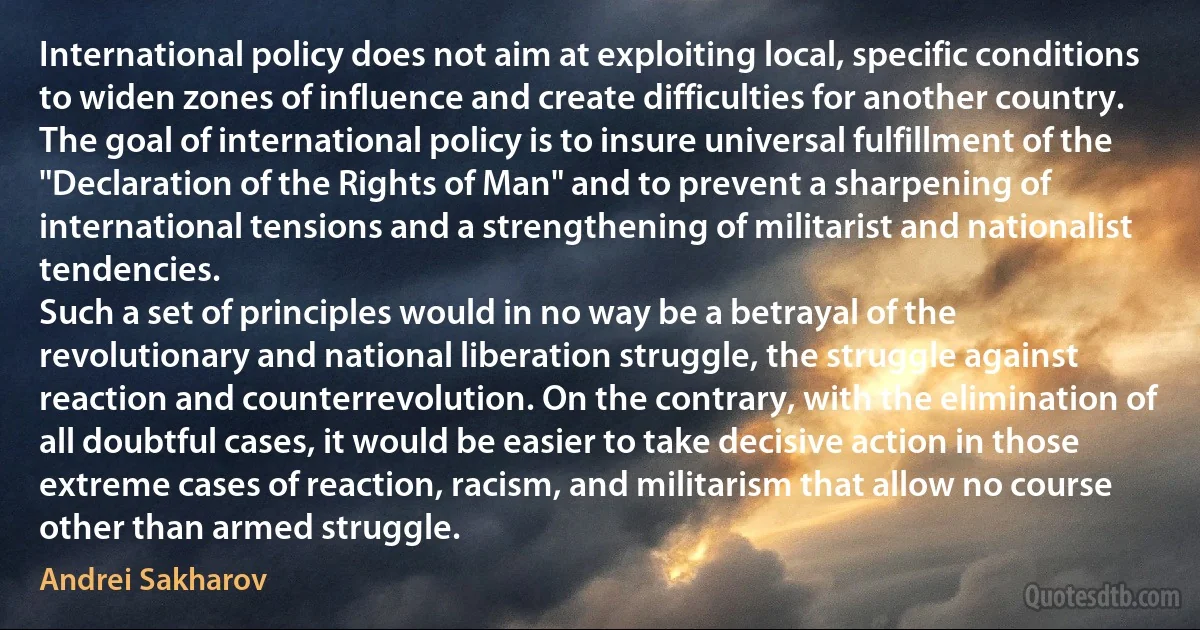
International policy does not aim at exploiting local, specific conditions to widen zones of influence and create difficulties for another country. The goal of international policy is to insure universal fulfillment of the "Declaration of the Rights of Man" and to prevent a sharpening of international tensions and a strengthening of militarist and nationalist tendencies. Such a set of principles would in no way be a betrayal of the revolutionary and national liberation struggle, the struggle against reaction and counterrevolution. On the contrary, with the elimination of all doubtful cases, it would be easier to take decisive action in those extreme cases of reaction, racism, and militarism that allow no course other than armed struggle.
Andrei SakharovRelated topics
action aim betrayal country course declaration difficulties easy elimination international liberation man militarism militarist national nationalist reaction set specific strengthening take universal way racismRelated quotes
So in addition to what I've quoted to you just now, in Prizren, I say particularly in this place and in this town, I want to tell you something that I consider to be the most important in this town, because in it, there are Serbs, Albanians, Muslims, Turks, Roma, and others. Every one of the ethnic groups, to a large proportion. That is why I believe that this town and this region should be an example of carrying out the policy of national equality of rights, a policy that would make it possible for all people to give - to live on a footing of equality and under humane conditions, that there should be a high degree of mutual understanding and that a joint life of all citizens should be built successfully.

Slobodan Milošević
To the biologist the problem of socialism appears largely as a problem of size. The extreme socialists desire to run every nation as a single business concern. I do not suppose that Henry Ford would find much difficulty in running Andorra or Luxembourg on a socialistic basis. He has already more men on his pay-roll than their population. It is conceivable that a syndicate of Fords, if we could find them, would make Belgium Ltd. or Denmark Inc. pay their way. But while nationalization of certain industries is an obvious possibility in the largest of states, I find it no easier to picture a completely socialized British Empire or United States than an elephant turning somersaults or a hippopotamus jumping a hedge.

J. B. S. Haldane
The growth in linguistic awareness about the problem, and the emergence of an associated activism, was one of the most exciting developments of the 1990s. Although awareness is still poor among the general public, the issues are now being much more widely discussed at professional levels, in a variety of international, national, regional, and local contexts. At one extreme, there are major campaigns such as those involved in promulgating the Barcelona Declaration of Linguistic Rights, or such initiatives as the `Red Book on Endangered Languages' (part of the Tokyo Clearing House project). At the other extreme, there is lively debate taking place within many of the endangered communities themselves. Mechanisms and structures are now in place to channel energies.

David Crystal
Extreme states of being, whether individual or collective, were once purposefully motivated. Some of those purposes no longer have meaning (expiation, salvation). The well-being of communities is no longer sought through means of doubtful effectiveness, but directly, through action. Under these conditions, extreme states of being fell into the domain of the arts, and not without a certain disadvantage. Literature (fiction) took the place of what had formerly been the spiritual life; poetry (the disorder of words) that of real states of trance. Art constituted a small free domain, outside action: to gain freedom it had to renounce the real world. This is a heavy price to pay, and most writers dream of recovering a lost reality. They must then pay in another sense, by renouncing freedom.

Georges Bataille
Our whole strength will be put into this war of emancipation, -- emancipation from the threat and attempted mastery of selfish groups of autocratic rulers, -- whatever the difficulties and present partial delays. We are indomitable in our power of independent action and can in no circumstances consent to live in a world governed by intrigue and force. We believe that our own desire for a new international order under which reason and justice and the common interests of mankind shall prevail is the desire of enlightened men everywhere. Without that new order the world will be without peace and human life will lack tolerable conditions of existence and development. Having set our hand to the task of achieving it, we shall not turn back.

Woodrow Wilson
